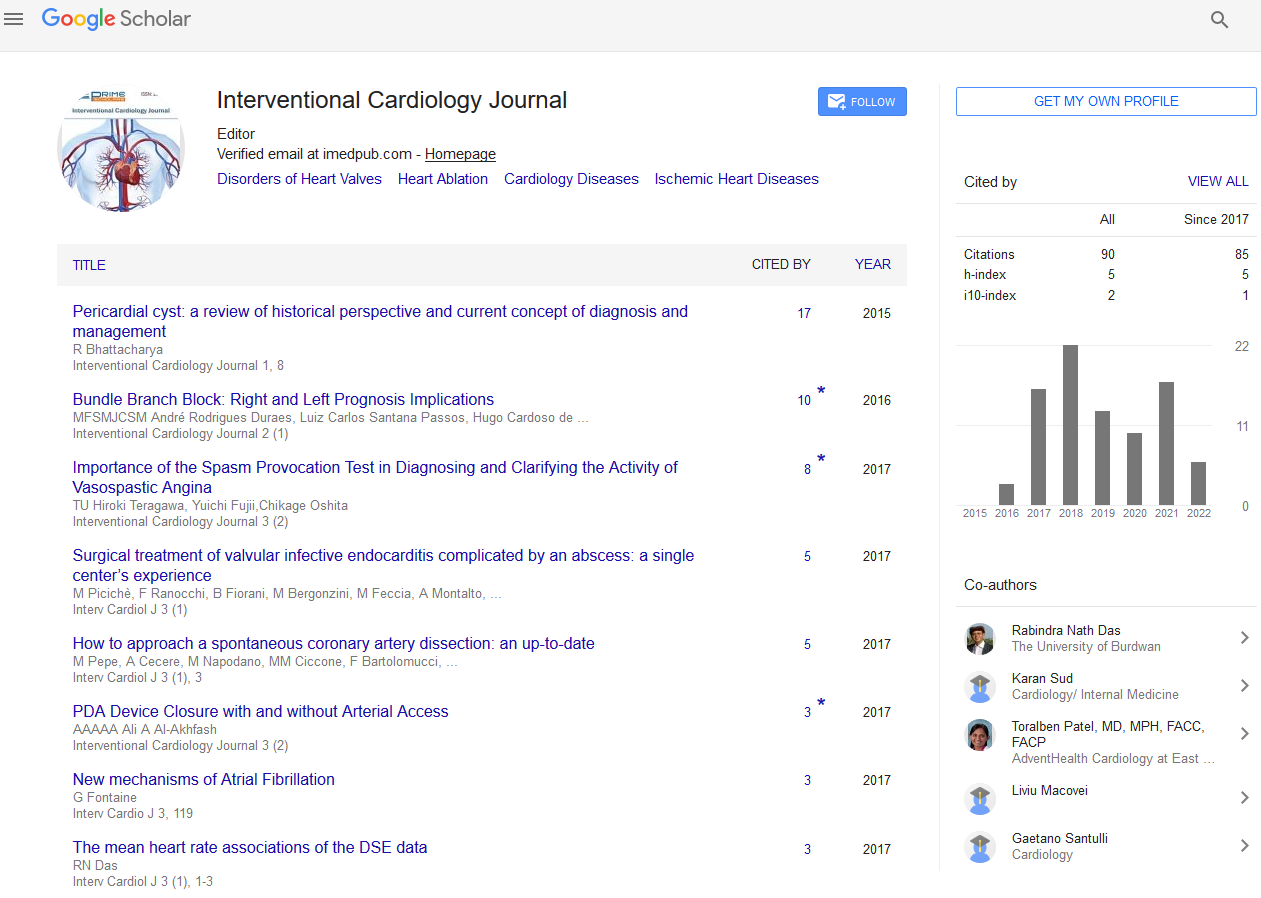Ataret Peretz*
Department of Cardiology, University of Groningen, Dordrecht, Netherlands
Corresponding author: Ataret Peretz
Department of Cardiology
University of Groningen
Dordrecht, Netherlands
E-mail: saadmizrahi@gmail.com
Citation: Peretz A (2021) Ventricular Tachycardia Recurrence, Hospitalization and Death Reduced With Catheter Ablation as First Line Therapy. Interv Cardiol J Vol.7 No.8:146 doi: 10.36648/2471-8157.7.8.146
Catheter ablation for atrial traumatic inflammation (AF) improves survival and impacts other outcomes in real-world heart failure (HF) patients is doubtful. This observe aimed to assess whether ablation reduces demise, and other outcomes in actual-world AF sufferers with HF. Among 834,735 sufferers with AF from 2006 to 2015 within the Korean National Health Insurance Service database, 3173 HF patients underwent AF ablation. Propensity rating weighting become used to accurate for variations between the groups. During median 54 months comply with-up, the risk of all-purpose demise in ablated patients was less than 1/2 of that in patients with scientific remedy (2.8 vs. 6.2 in line with 100 man or woman-years; threat ratio 0.42, 95% self-belief interval [1]. Ablation became associated with lower chance of cardiovascular demise, HF admission and stroke/systemic embolism. In subgroup evaluation, the chance of all-purpose demise became decreased in most subgroups except inside the aged (≥ 75 years) and strictly anticoagulated patients. Ablation can be related to reduced threat of allmotive dying and cardiovascular dying in actual-world AF sufferers with HF, helping the position of AF ablation in patients with HF.
Atrial traumatic inflammation (AF) and coronary heart failure are essential cardiac conditions related to the patient's morbidity and mortality. The conditions frequently coexist and may promote every other. Up to 30% of sufferers with coronary heart failure have AF. AF in patients with heart failure is associated with accelerated hospitalization, the burden on the health care machine, stroke, and mortality [2]. Loss of atrial contraction, irregular and fast ventricular prices in AF can lead to left ventricular disorder and reduced cardiac output and those functions of AF may be at the least partially contributed to poor prognosis of heart failure sufferers.
Catheter ablation for AF is extra effective than antiarrhythmic capsules (AADs) in lowering AF recurrences; AF catheter ablation also extends the length of the sinus rhythm and improves the patient's first-class of life. Several observational studies have shown that retaining sinus rhythm via AF catheter ablation in heart failure sufferers can extensively improve cardiac characteristic. Recently, a trial evaluating ablation as compared with medical therapy in symptomatic sufferers with AF and heart failure furnished evidence suggesting that a success ablation can also extend survival15. However, because most effective thirteen. 2% of the screened coronary heart failure sufferers have been enrolled in randomization in the study, the effect of AF ablation in heart failure sufferers remains controversial [3]. In the CABANA (Catheter Ablation vs. Antiarrhythmic Drug Therapy for Atrial Fibrillation) trial, the currently accomplished randomized managed trial on the results of AF catheter ablation, AF catheter ablation did not extensively reduce the primary endpoint (a composite of demise, disabling stroke, extreme bleeding, or cardiac arrest) as compared to clinical remedy. The determination whether or not AF catheter ablation in heart failure patients can reduce the risk of all-purpose loss of life, cardiovascular death, and other cardiac occasions in an actualinternational nationwide cohort. Optimal timing of catheter ablation is an vital but unresolved situation. While potential researches have centred at the issue of prophylactic ablation and evaluation with ICD therapy, there are presently no published RCTs addressing the first question.
A multicentre, randomized, controlled trial regarding sufferers with ischemic cardiomyopathy and an ICD who had ventricular tachycardia no matter the use of antiarrhythmic capsules. Patients had been randomly assigned to receive either catheter ablation (ablation institution) with continuation of baseline antiarrhythmic medications or escalated antiarrhythmic drug therapy (escalatedremedy organization). In the escalated-remedy organization, amiodarone turned into initiated if some other agent had been used previously. The dose of amiodarone become extended if it had been much less than 300 mg in line with day or mexiletine turned into delivered if the dose was already as a minimum three hundred mg per day [4]. The number one final results changed into a composite of death, three or extra documented episodes of ventricular tachycardia within 24 hours (ventricular tachycardia hurricane), or suitable ICD surprise. In sufferers with ischemic cardiomyopathy and an ICD who had ventricular tachycardia regardless of antiarrhythmic drug therapy, there has been a appreciably lower price of the composite primary outcome of dying, ventricular tachycardia storm, or suitable ICD surprise among sufferers undergoing catheter ablation than amongst those receiving an escalation in antiarrhythmic drug remedy.
References
- 1. O'Byrne ML, Levi DS (2019) State of the Art Atrial Septal Defect Closure Devices for Congenital Heart. Interv Cardiol Clin 8: 11-21.
- 2. Faccini A, Butera G (2018) Atrial septal defect (ASD) device transcatheter closure: limitations. J Thorac Dis 10: S2923-S2930.
- 3. Luo H, Wang J, Qiao C, Xin Z, Weihua Z, et al. (2014) Evaluation of different minimally invasive techniques in the surgical treatment of atrial septal defect. J Thorac Cardiovasc Surg 148: 188-193.
- 4. Petit CJ, Justino H, Pignatelli RH, Matthew AC, William AP, et al. (2013) Percutaneous atrial septal defect closure in infants and toddlers: predictors of success. Pediatr Cardiol 34: 220-225.

